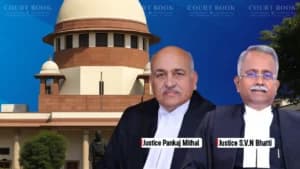Recently during an event organised by the High Court Bar Association (HCBA), Nagpur, Supreme Court judge Justice Dipankar Datta raised serious concerns about the Collegium System and external forces influencing the judicial appointment process. He strongly criticised the notion that judges appoint judges and said that this notion is "wrong."
"We need to tell the society that if judges appointed judges, all the recommendations of the Supreme Court Collegium would have been implemented. But this does not happen," Justice Dipankar Datta said.
Recalling an instance from 2019 during his tenure in the Calcutta High Court Collegium, he mentioned how a lawyer's recommendation for a judgeship had not been acted upon even after six years. He questioned the silence over such delays and urged that these external forces must be dealt with strictly.
Read also: Supreme Court to Hear Plea Against Maratha Reservation in July
"External forces that prevent action on Collegium recommendations must be dealt with strictly. Pending proceedings must be given priority to ensure that only merit is considered," he said.
Justice Dipankar Datta appealed to Chief Justice of India (CJI) Bhushan Gavai to break the misconception that "judges appoint judges" and bring more transparency in the system.
"Sir (CJI Gavai), this is an appeal to you… now is the time to dispel this misconception. The critics have become vocal. Why should the Collegium system not be questioned?"
Read also: NEET-PG 2024: Petition in Supreme Court Against Conversion of Chandigarh UT Quota to All India
He also highlighted how three chief justices of the Bombay high court in the 1980s—MN Chandurkar, Chittosh Mukherjee and PD Desai—were not elevated to the Supreme Court. He questioned why such exclusions were not criticised despite their abilities in the pre-collegium era.
"Does anyone question why CJ Chandurkar, CJ Mukherjee or CJ Desai could not come to the Supreme Court despite their credentials?"
Justice Dipankar Datta acknowledged past opaqueness in the collegium but said that under the current leadership, the system has become "transparent".
"Under your leadership (CJI Gavai), we expect a completely transparent process. As you have rightly said, there can be no compromise on merit."
Read also: Supreme Court Refuses to Grant Bail to PFI Leader AS Ismail on Medical Grounds, Seeks Report on
Responding to these concerns, CJI Bhushan Gavai emphasised the steps taken for transparency, saying the recent elevation of Justice Atul Chandurkar, the senior-most judge of the Bombay High Court, was evidence of the increasing openness of the system.
"We interact with candidates. We focus on both seniority and merit. The appointment of Justice Atul Chandurkar is a living example of transparency in the collegium system," CJI Gavai said.
Justice Dipankar Datta also spoke on judicial activism, acknowledging its relevance but cautioning against crossing the limits.
"Judicial activism sometimes becomes judicial adventurism and if it crosses the line it can also be termed as judicial terrorism."
He urged judicial officers to follow five guiding principles:
- Dharma – righteousness, not religion.
- Satya – truthfulness.
- Niti – legal principles and constitutional values.
- Nyay – justice to the people.
- Shanti – peace in society.
He concluded, "We should never cross the Laxman Rekha. Our orders should not cause unrest in society."
Justice Dipankar Datta's remarks emphasise the need for greater clarity, accountability and fairness in India's judicial appointment process while respecting constitutional values.














